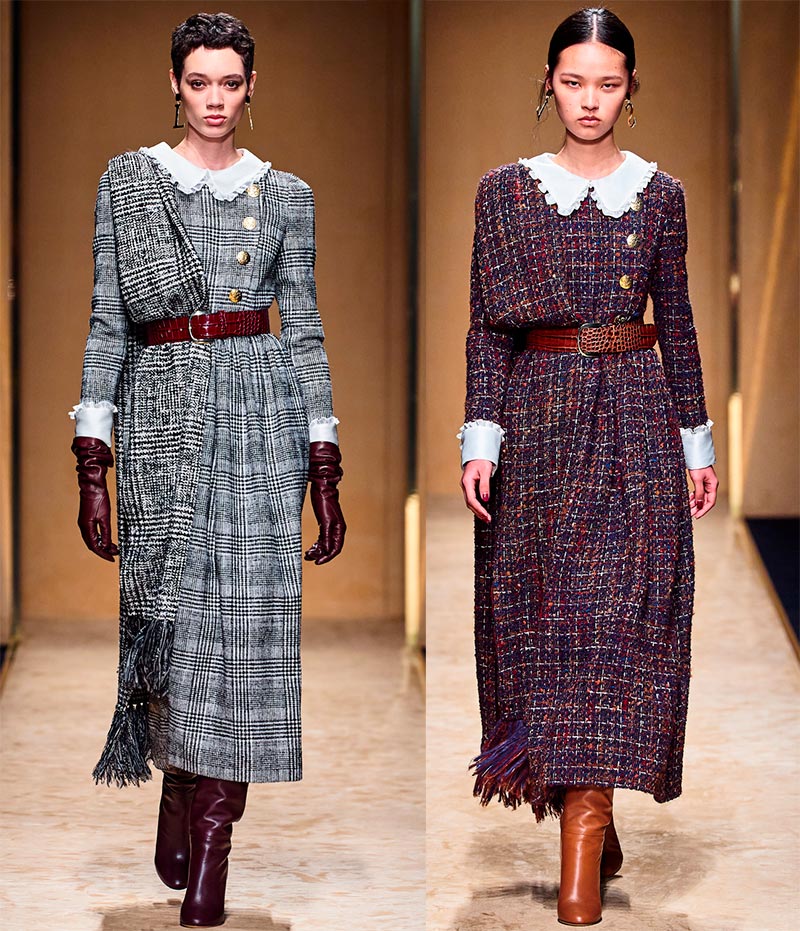
The dinner was
served up in the great hall, where the squire always held his Christmas
banquet. A blazing, crackling fire of logs had been heaped on to warm
the spacious apartment, and the flame went sparkling and wreathing up
the wide-mouthed chimney. The great picture of the crusader and his
white horse had been profusely decorated with greens for the occasion;
and holly and ivy had likewise been wreathed round the helmet and
weapons on the opposite wall, which I understood were the arms of the
same warrior. I must own, by-the-bye, I had strong doubts about the
authenticity of the painting and armour as having belonged to the
crusader, they certainly having the stamp of more recent days; but I was
told that the painting had been so considered time out of mind; and
that, as to the armour, it had been found in a lumber room, and elevated
to its present situation by the squire, who at once determined it to be
the armour of the family hero; and as he was absolute authority on all
such subjects in his own household, the matter had passed into current
acceptation. A sideboard was set out just under this chivalric trophy,
on which was a display of plate that might have vied (at least in
variety) with Belshazzar’s parade of the vessels of the temple: -
“flagons, cans, cups, beakers, goblets, basins, and ewers”; the gorgeous
utensils of good companionship that had gradually accumulated through
many generations of jovial housekeepers. Before these stood the two Yule
candles, beaming like two stars of the first magnitude; other lights
were distributed in branches, and the whole array glittered like a
firmament of silver.
We were ushered into
this banqueting scene with the sound of minstrelsy, the old harper
being seated on a stool beside the fireplace, and twanging his
instrument with a vast deal more power than melody. Never did Christmas
board display a more goodly and gracious assemblage of countenances;
those who were not handsome were, at least, happy; and happiness is a
rare improver of your hard-favoured visage. I always consider an old
English family as well worth studying as a collection of Holbein’s
portraits or Albert Dürer’s prints. There is much antiquarian lore to be
acquired; much knowledge of the physiognomies of former times. Perhaps
it may be from having continually before their eyes those rows of old
family portraits with which the mansions of this country are stocked;
certain it is, that the quaint features of antiquity are often most
faithfully perpetuated in these ancient lines; and I have traced an old
family nose through a whole picture-gallery, legitimately handed down
from generation to generation, almost from the time of the Conquest.
Something of the kind was to be observed in the worthy company around
me. Many of their faces had evidently originated in a gothic age, and
been merely copied by succeeding generations; and there was one little
girl in particular, of staid demeanour, with a high Roman nose, and an
antique vinegar aspect, who was a great favourite of the squire’s,
being, as he said, a Bracebridge all over, and the very counterpart of
one of his ancestors who figured in the court of Henry VIII.
The parson said
grace, which was not a short, familiar one, such as is commonly
addressed to the Deity in these uncere monious days; but a long,
courtly, well-worded one of the ancient school. There was now a pause,
as if something was expected; when suddenly the butler entered the hall
with some degree of bustle: he was attended by a servant on each side
with a large wax-light, and bore a silver dish, on which was an enormous
pig’s head, decorated with rosemary, with a lemon in its mouth, which
was placed with great formality at the head of the table. The moment
this pageant made its appearance, the harper struck up a flourish; at
the conclusion of which the young Oxonian, on receiving a hint from the
squire, gave, with an air of the most comic gravity, an old carol, the
first verse of which was as follows:
Caput apri defero,
Reddens laudes Domino.
The boar’s head in hand bring I,
With garlands gay and rosemary.
I pray you all synge merily
Qui estis in convivio.
Though prepared to
witness many of these little eccentricities, from being apprised of the
peculiar hobby of mine host; yet, I confess, the parade with which so
odd a dish was introduced somewhat perplexed me, until I gathered from
the conversation of the squire and the parson, that it was meant to
represent the bringing in of the boar’s head; a dish formerly served up
with much ceremony and the sound of minstrelsy and song, at great
tables, on Christmas day. “I like the old custom,” said the squire, “not
merely because it is stately and pleasing in itself, but because it was
observed at the college at Oxford at which I was educated. When I hear
the old song chanted, it brings to mind the time when I was young and
gamesome and the noble old college hall and my fellow students loitering
about in their black gowns; many of whom, poor lads, are now in their
graves!”
The parson, however,
whose mind was not haunted by such associations, and who was always
more taken up with the text than the sentiment, objected to the
Oxonian’s version of the carol, which, he affirmed, was different from
that sung at college. He went on, with the dry perseverance of a
commentator, to give the college reading, accompanied by sundry
annotations; addressing himself at first to the company at large; but
finding their attention gradually diverted to other talk and other
objects, he lowered his tone as his number of auditors diminished, until
he concluded his remarks in an under voice to a fat-headed old
gentleman next him, who was silently engaged in the discussion of a huge
plateful of turkey.
The table was
literally loaded with good cheer, and presented an epitome of country
abundance, in this season of overflowing larders. A distinguished post
was allotted to “ancient sirloin,” as mine host termed it; being, as he
added, “the stand ard of old English hospitality, and a joint of goodly
presence, and full of expectation.” There were several dishes quaintly
decorated, and which had evidently something traditional in their
embellishments; but about which, as I did not like to appear
over-curious, I asked no questions.
I could not,
however, but notice a pie, magnificently decorated with peacock’s
feathers, in imitation of the tail of that bird, which overshadowed a
considerable tract of the table. This, the squire confessed, with some
little hesitation, was a pheasant pie, though a peacock pie was
certainly the most authentical; but there had been such a mortality
among the peacocks this season, that he could not prevail upon himself
to have one killed.
It would be tedious,
perhaps, to my wiser readers, who may not have that foolish fondness
for odd and obsolete things, to which I am a little given, were I to
mention the other makeshifts of this worthy old humorist, by which he
was endeavouring to follow up, though at humble distance, the quaint
customs of antiquity. I was pleased, however, to see the respect shown
to his whims by his children and relatives; who, indeed, entered readily
into the full spirit of them, and seemed all well versed in their
parts; having doubtless been present at many a rehearsal. I was amused,
too, at the air of profound gravity with which the butler and other
servants executed the duties assigned them, however eccentric. They had
an old-fashioned look; having, for the most part, been brought up in the
household, and grown into keeping with the antiquated mansion, and the
humours of its lord; and most probably looked upon all his whimsical
regulations as the established laws of honourable housekeeping.
When the cloth was
removed, the butler brought in a huge silver vessel of rare and curious
workmanship, which he placed before the squire. Its appearance was
hailed with acclamation; being the Wassail Bowl, so renowned in
Christmas festivity. The contents had been prepared by the squire
himself; for it was a beverage in the skilful mixture of which he
particularly prided himself; alleging that it was too abstruse and
complex for the comprehension of an ordinary servant. It was a potation,
indeed, that might well make the heart of a toper leap within him;
being composed of the richest and raciest wines, highly spiced and
sweetened, with roasted apples bobbing about the surface.
The old gentleman’s
whole countenance beamed with a serene look of indwelling delight, as he
stirred this mighty bowl. Having raised it to his lips, with a hearty
wish of a merry Christmas to all present, he sent it brimming round the
board, for every one to follow his example, according to the primitive
style; pronouncing it “the ancient fountain of good feeling, where all
hearts met together.”
There was much
laughing and rallying as the honest emblem of Christmas joviality
circulated, and was kissed rather coyly by the ladies. When it reached
Master Simon, he raised it in both hands, and with the air of a boon
companion struck up an old Wassail chanson:
The brown bowle,
The merry brown bowle,
As it goes round-about-a,
Fill
Still,
Let the world say what it will,
And drink your fill all out-a.
The deep canne,
The merry deep canne,
As thou dost freely quaff-a,
Sing
Fling,
Be as merry as a king,
And sound a lusty laugh-a.
Much of the
conversation during dinner turned upon family topics, to which I was a
stranger. There was, however, a great deal of rallying of Master Simon
about some gay widow, with whom he was accused of having a flirtation.
This attack was commenced by the ladies; but it was continued throughout
the dinner by the fat-headed old gentleman next the parson, with the
persevering assiduity of a slow hound; being one of those long-winded
jokers, who, though rather dull at starting game, are unrivalled for
their talent in hunting it down. At every pause in the general
conversation, he renewed his bantering in pretty much the same terms;
winking hard at me with both eyes, whenever he gave Master Simon what he
considered a home thrust. The latter, indeed, seemed fond of being
teased on the subject, as old bachelors are apt to be; and he took
occasion to inform me, in an under tone, that the lady in question was a
prodigiously fine woman, and drove her own curricle.
The dinner-time
passed away in this flow of innocent hilarity; and, though the old hall
may have resounded in its time with many a scene of broader rout and
revel, yet I doubt whether it ever witnessed more honest and genuine
enjoyment. How easy it is for one benevolent being to diffuse pleasure
around him; and how truly is a kind heart a fountain of gladness, making
everything in its vicinity to freshen into smiles ! The joyous
disposition of the worthy squire was perfectly contagious; he was happy
himself, and disposed to make all the world happy; and the little
eccentricities of his humour did but season, in a manner, the sweetness
of his philanthropy.
When the ladies had
retired, the conversation, as usual, became still more animated; many
good things were broached which had been thought of during dinner, but
which would not exactly do for a lady’s ear; and though I cannot
positively affirm that there was much wit uttered, yet I have certainly
heard many contests of rare wit produce much less laughter. Wit, after
all, is a mighty, tart, pungent, ingredient, and much too acid for some
stomachs; but honest good humour is the oil and wine of a merry meeting,
and there is no jovial companionship equal to that where the jokes are
rather small, and the laughter abundant.
The squire told
several long stories of early college pranks and adventures, in some of
which the parson had been a sharer; though in looking at the latter, it
required some effort of imagination to figure such a little dark anatomy
of a man into the perpetrator of a madcap gambol. Indeed, the two
college chums presented pictures of what men may be made by their
different lots in life. The squire had left the university to live
lustily on his parental domains, in the vigorous enjoyment of prosperity
and sunshine, and had flourished on to a hearty and florid old age;
whilst the poor parson, on the contrary, had dried and withered away,
among dusty tomes, in the silence and shadows of his study. Still there
seemed to be a spark of almost extinguished fire, feebly glimmering in
the bottom of his soul; and as the squire hinted at a sly story of the
parson and a pretty milkmaid, whom they once met on the banks of the
Isis, the old gentleman made an “alphabet of faces,” which, as far as I
could decipher his physiognomy, I verily believe was indicative of
laughter; indeed, I have rarely met with an old gentleman that took
absolute offence at the imputed gallantries of his youth.
I found the tide of
wine and wassail fast gaining on the dry land of sober judgment. The
company grew merrier and louder as their jokes grew duller. Master Simon
was in as chirping a humour as a grasshopper filled with dew; his old
songs grew of a warmer complexion, and he began to talk maudlin about
the widow. He even gave a long song about the wooing of a widow, which
he informed me he had gathered from an excellent black letter work,
entitled Cupid’s Solicitor for Love, containing store of good advice for
bachelors, and which he promised to lend me; the first verse was to
this effect:
He that will woo a widow must not dally,
He must make hay while the sun doth shine;
He must not stand with her - shall I, shall I ?
But boldly say, Widow, thou must be mine.
This song inspired
the fat-headed old gentleman, who made several attempts to tell a rather
broad story out of Joe Miller, that was pat to the purpose; but he
always stuck in the middle, everybody recollecting the latter part
excepting himself. The parson, too, began to show the effects of good
cheer, having gradually settled down into a doze, and his wig sitting
most suspiciously on one side. Just at this juncture we were summoned to
the drawing-room, and I suspect, at the private instigation of mine
host, whose joviality seemed always tempered with a proper love of
decorum.
After the
dinner-table was removed, the hall was given up to the younger members
of the family, who, prompted to all kind of noisy mirth by the Oxonian
and Master Simon, made its old walls ring with their merriment, as they
played at romping games. I delight in witnessing the gambols of
children, and particularly at this happy holiday season, and could not
help stealing out of the drawing-room on hearing one of their peals of
laughter. I found them at the game of blind-man’s-buff. Master Simon,
who was the leader of their revels, and seemed on all occasions to
fulfil the office of that ancient potentate, the Lord of Misrule, was
blinded in the midst of the hall. The little beings were as busy about
him as the mock fairies about Falstaff; pinching him, plucking at the
skirts of his coat, and tickling him with straws. One fine blue-eyed
girl of about thirteen, with her flaxen hair all in beautiful confusion,
her frolic face in a glow, her frock half torn off her shoulders, a
complete picture of a romp, was the chief tormentor; and, from the
slyness with which Master Simon avoided the smaller game, and hemmed
this wild little nymph in corners, and obliged her to jump shrieking
over chairs, I suspected the rogue of being not a whit more blinded than
was convenient.
When I returned to
the drawing-room, I found the company seated round the fire listening to
the parson, who was deeply ensconced in a high-backed oaken chair, the
work of some cunning artificer of yore, which had been brought from the
library for his particular accommodation. From this venerable piece of
furniture, with which his shadowy figure and dark weazen face so
admirably accorded, he was dealing out strange accounts of the popular
superstitions and legends of the surrounding country, with which he had
become acquainted in the course of his antiquarian researches. I am half
inclined to think that the old gentleman was himself somewhat tinctured
with superstition, as men are very apt to be who live a recluse and
studious life in a sequestered part of the country, and pore over
black-letter tracts, so often filled with the marvellous and
supernatural. He gave us several anecdotes of the fancies of the
neighbouring peasantry, concerning the effigy of the crusader, which lay
on the tomb by the church altar. As it was the only monument of the
kind in that part of the country it had always been regarded with
feelings of superstition by the good wives of the village. It was said
to get up from the tomb and walk the rounds of the churchyard in stormy
nights, particularly when it thundered; and one old woman, whose cottage
bordered on the churchyard, had seen it through the windows of the
church, when the moon shone, slowly pacing up and down the aisles. It
was the belief that some wrong had been left unredressed by the
deceased, or some treasure hidden, which kept the spirit in a state of
trouble and restlessness. Some talked of gold and jewels buried in the
tomb, over which the spectre kept watch; and there was a story current
of a sexton in old times who endeavoured to break his way to the coffin
at night, but, just as he reached it, received a violent blow from the
marble hand of the effigy, which stretched him senseless on the
pavement. These tales were often laughed at by some of the sturdier
among the rustics, yet when night came on, there were many of the
stoutest unbelievers that were shy of venturing alone in the footpath
that led across the churchyard.
From these and other
anecdotes that followed, the crusader appeared to be the favourite hero
of ghost stories throughout the vicinity. His picture which hung up in
the hall, was thought by the servants to have something supernatural
about it; for they remarked that, in whatever part of the hall you went,
the eyes of the warrior were still fixed on you. The old porter’s wife,
too, at the lodge, who had been born and brought up in the family, and
was a great gossip among the maid-servants, affirmed that in her young
days she had often heard say, that on Midsummer eve, when it was well
known all kinds of ghosts, goblins, and fairies become visible and walk
abroad, the crusader used to mount his horse, come down from his
picture, ride about the house, down the avenue, and so to the church to
visit the tomb; on which occasion the church door most civilly swung
open of itself; not that he needed it; for he rode through closed gates
and even stone walls, and had been seen by one of the dairymaids to pass
between two bars of the great park gate, making himself as thin as a
sheet of paper.
All these
superstitions I found had been very much countenanced by the squire,
who, though not superstitious himself, was very fond of seeing others
so. He listened to every goblin tale of the neighbouring gossips with
infinite gravity, and held the porter’s wife in high favour on account
of her talent for the marvellous. He was himself a great reader of old
legends and romances, and often lamented that he could not believe in
them; for a superstitious person, he thought, must live in a kind of
fairy land.
Whilst we were all
attention to the parson’s stories, our ears were suddenly assailed by a
burst of heterogeneous sounds from the hall, in which were mingled
something like the clang of rude minstrelsy, with the uproar of many
small voices and girlish laughter. The door suddenly flew open, and a
train came trooping into the room, that might almost have been mistaken
for the breaking-up of the court of Fairy. That indefatigable spirit,
Master Simon, in the faithful discharge of his duties as Lord of
Misrule, had conceived the idea of a Christmas mummery or masking; and
having called in to his assistance the Oxonian and the young officer,
who were equally ripe for anything that should occasion romping and
merriment, they had carried it into instant effect. The old housekeeper
had been consulted; the antique clothes-presses and wardrobes rummaged,
and made to yield up the relics of finery that had not seen the light
for several generations; the younger part of the company had been
privately convened from the parlour and hall, and the whole had been
bedizened out, into a burlesque imitation of an antique mask.
Master Simon led the
van, as “Ancient Christmas,” quaintly apparelled in a ruff, a short
cloak, which had very much the aspect of one of the old housekeeper’s
petticoats, and a hat that might have served for a village steeple, and
must indubitably have figured in the days of the Covenanters. From under
this his nose curved boldly forth, flushed with a frostbitten bloom,
that seemed the very trophy of a December blast. He was accompanied by
the blue-eyed romp, dished up as “Dame Mince Pie,” in the venerable
magnificence of a faded brocade, long stomacher, peaked hat, and
high-heeled shoes. The young officer appeared as Robin Hood, in a
sporting dress of Kendal green, and a foraging cap with a gold tassel.
The costume, to be
sure, did not bear testimony to deep research, and there was an evident
eye to the picturesque, natural to a young gallant in the presence of
his mistress. The fair Julia hung on his arm in a pretty rustic dress,
as “Maid Marian.” The rest of the train had been metamorphosed in
various ways; the girls trussed up in the finery of the ancient belles
of the Bracebridge line, and the striplings bewhiskered with burnt cork,
and gravely clad in broad skirts, hanging sleeves, and full-bottomed
wigs, to represent the character of Roast Beef, Plum Pudding, and other
worthies celebrated in ancient maskings. The whole was under the control
of the Oxonian, in the appropriate character of Misrule; and I observed
that he exercised rather a mischievous sway with his wand over the
smaller personages of the pageant.
The irruption of
this motley crew, with beat of drum, according to ancient custom, was
the consummation of uproar and merriment. Master Simon covered himself
with glory by the stateliness with which, as Ancient Christmas, he
walked a minuet with the peerless, though giggling, Dame Mince Pie. It
was followed by a dance of all the characters, which, from its medley of
costumes, seemed as though the old family portraits had skipped down
from their frames to join in the sport. Different centuries were
figuring at cross hands and right and left; the dark ages were cutting
pirouettes and rigadoons; and the days of Queen Bess jiggling merrily
down the middle, through a line of succeeding generations.
The worthy squire
contemplated these fantastic sports, and this resurrection of his old
wardrobe, with the simple relish of childish delight. He stood chuckling
and rubbing his hands, and scarcely hearing a word the parson said,
notwithstanding that the latter was discoursing most authentically on
the ancient and stately dance at the Paon, or peacock, from which he
conceived the minuet to be derived. For my part I was in a continual
excitement, from the varied scenes of whim and innocent gaiety passing
before me. It was inspiring to me to see wild-eyed frolic and
warm-hearted hospitality breaking out from among the chills and glooms
of winter, and old age throwing off his apathy, and catching once more
the freshness of youthful enjoyment. I felt also an interest in the
scene, from the consideration that these fleeting customs were posting
fast into oblivion, and that this was, perhaps, the only family in
England in which the whole of them were still punctiliously observed.
There was a quaintness, too, mingled with all this revelry, that gave it
a peculiar zest: it was suited to the time and place; and as the old
manor-house almost reeled with mirth and wassail, it seemed echoing back
the joviality of long departed years.
But enough of
Christmas and its gambols; it is time for me to pause in this garrulity.
Methinks I hear the questions asked by my grave readers, “To what
purpose is all this how is the world to be made wiser by this talk ?”
Alas ! is there not wisdom enough extant for the instruction of the
world ? And if not, are there not thousands of abler pens labouring for
its improvement ! It is so much pleasanter to please than to instruct,
to play the companion rather than the preceptor.
What, after all, is
the mite of wisdom that I could throw into the mass of knowledge; or how
am I sure that my sagest deductions may be safe guides for the opinion
of others? But in writing to amuse, if I fail, the only evil is in my
own disappointment. If, however, I can by any lucky chance, in these
days of evil, rub out one wrinkle from the brow of care, or beguile the
heavy heart of one moment of sorrow; if I can now and then penetrate
through the gathering film of misanthropy, prompt a benevolent view of
human nature, and make my reader more in good humour with his
fellow-beings and himself, surely, surely, I shall not then have written
entirely in vain.
















